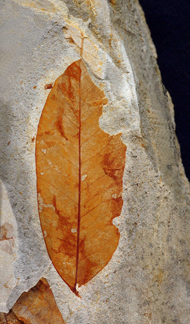 When the planet
warmed rapidly around 55.8 million years ago, animals moved into regions with
more familiar climates, paleontologists have found. But researchers have had
a much harder time determining whether plants did the same, until now.
When the planet
warmed rapidly around 55.8 million years ago, animals moved into regions with
more familiar climates, paleontologists have found. But researchers have had
a much harder time determining whether plants did the same, until now. The fossilized leaf shown here, related to the bean family, is one of the plant species that spread north to the Bighorn Basin in Wyoming, around 55 million years ago, when global temperatures were increasing quickly. Image courtesy of Scott L. Wing/Science.
While local plant communities persisted in two sites in what is now Wyoming, interlopers from southern and eastern North America and from Europe made their way to the sites when global temperatures shot up by 5 to 10 degrees Celsius over 10,000 to 20,000 years, according to well-preserved plant fossils. During this period, known as the Paleocene-Eocene Thermal Maximum (PETM), some plant species extended their ranges by around 1,500 kilometers, moving up from the Gulf Coast, according to a team of researchers led by Scott Wing of the Smithsonian National Museum of Natural History, in Washington, D.C.
As described in the Nov. 11 Science, the plant fossils show highly variable weather: Legumes that made their way north liked dry weather, but other migrating plants preferred it wetter. Each group lived in the same place only several thousand years apart. Other such rapid ecological changes may be hidden elsewhere in the fossil record, Wing and his co-workers argue, and similar plant migrations could happen again today if rapid climate change takes place.
“What’s valuable about the PETM is that it quantifies what’s going to happen” if the world quickly kicks into a greenhouse climate, says Greg Retallack, a geologist specializing in ancient soils at the University of Oregon in Eugene (who first heard Wing et al.’s results at the Geological Society of America annual meeting in Salt Lake City last October). That response will be complex, he says, but “we have a long way to go to get to PETM conditions.”

